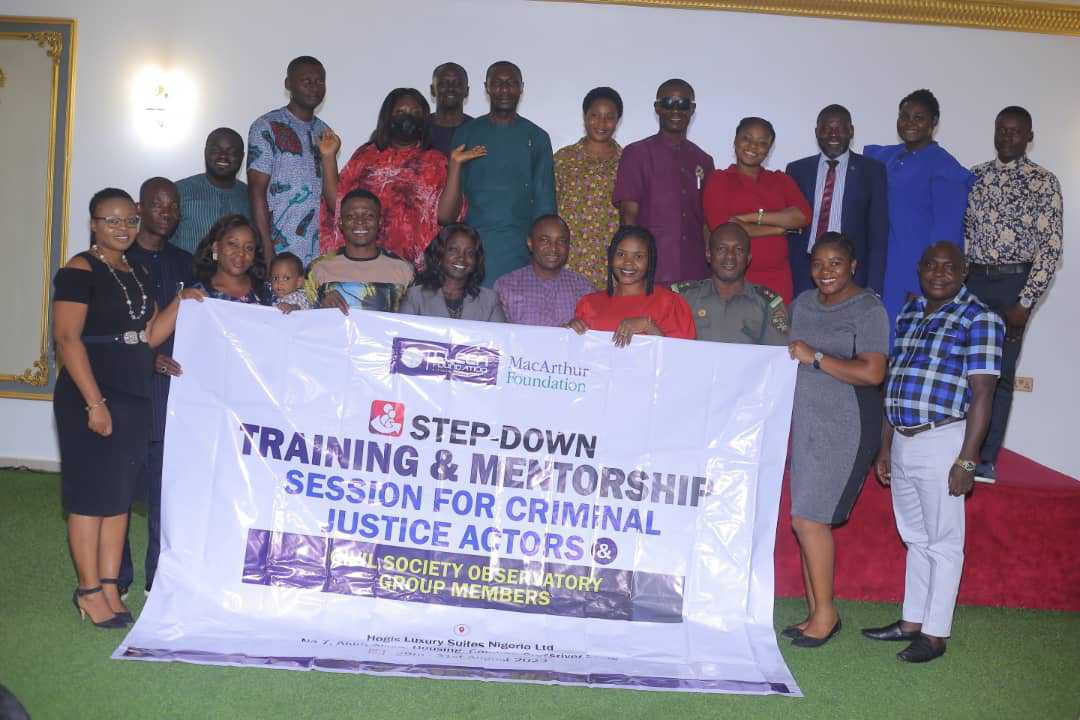By Godwin Otang
Despite Cross River State being one of the earliest states to pass the Administration of Criminal Justice Law, ACJL, Civil Society Organizations and Criminal Justice actors in the state are seeking improvement in the implementation of the Law, as they have noted that the State is still backward in implementation.
The demands for improvements were made at a three-day step-down training for Criminal Justice actors and mentorship of the civil society observatory held in Calabar.
The training and stakeholder engagement was organized by the Cleen Foundation for three days between August 29 to 31, 2023. It had different CSOs in attendance plus members of the Cross River State observatory.
In an address to stakeholders who included 20 different CSOs, men of the Nigerian Police, Correctional Service, lawyers, National Human Rights Commission, Nigerian Security, and Civil Defence Corps as well as the media; the Executive Director, of Cleen Foundation Mr. Gad Peter, called for improved tools, knowledge, and insights for the effective implementation of the ACJL.
“It is important that those who are entrusted with upholding the law and administering justice are equipped with the latest tools, knowledge, and insights.”
The State Correctional Service Public Relations Officer, Efangha Etim, said “The ACJAL is applicable also in the Correctional Service. Today at Calabar Correction Centres we have recorded a capacity of about 583, which is not supposed to be so.
“A lot has to be put in place so that the center is decongested; the capacity for 16 inmates we are running over 60 to 70 which is excess. The federal government has approved that the state governments should support feeding inmates. So let’s have stakeholders sit up.”
Also, Mrs. Lilian, State Counsel Representing the International Federation of Women Lawyers Federación Internacional Dé Abogadas, FIDA, said only the full implementation of the ACJA/L will decongest the Correctional facility.
On her part, L. O Asuquo, State Counsel, Ministry of Justice, Department of Public Prosecution held that the “area of implementation is improved resources for the discharge of our duties: logistics if we should say so.”
Mr. Bernard Ekobay, Senior Programs Officer from Cleen Foundation, summarized, “We have been to Cross River twice, to launch the independent CSOs observatory group due to poor implementation and domestication in the past. In Cross River, out of 25, 17 cases have been concluded, with 7 cases pending which is very commendable. So in the State ACJL is taken seriously.
“We are also here to bring stakeholders to a table to discuss the challenges, strengths, and weaknesses that the ACJL presents. To make them work in synergy while implementing the law in the State. We want to see an effective implementation; that trials are speedily and justly dispensed,” he said.
The training featured interactions amongst stakeholders across sectors on the implementation of the ACJL; cluster interactions, brainstorming sessions, and inter-agency collaboration ideas.
The three days climaxed with multi-stakeholder interactions amongst different CSOs – FIDA, Basic Right Counsel Initiative (BRCI), Girls Power Initiative (GPI), and 17 others.

Leave feedback about this